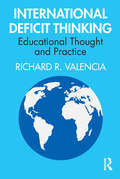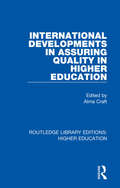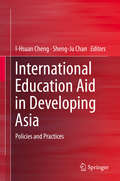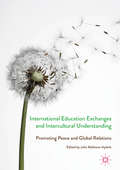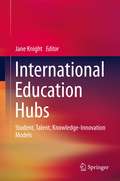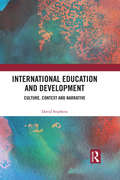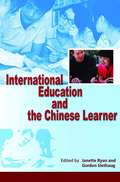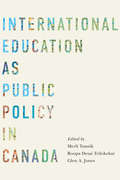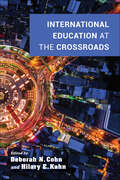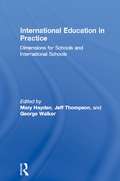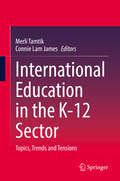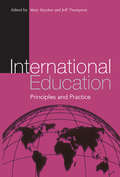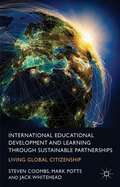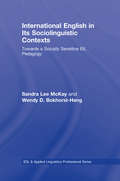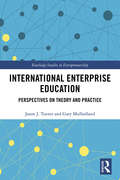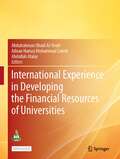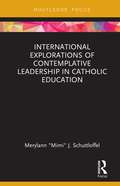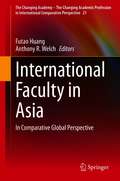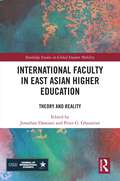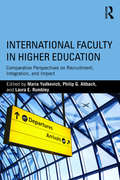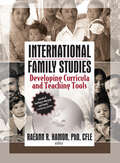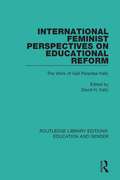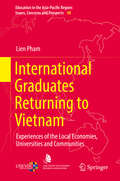- Table View
- List View
International Deficit Thinking: Educational Thought and Practice
by Richard R. ValenciaInternational Deficit Thinking: Educational Thought and Practice explores the incontrovertible reality of the persistent and pervasive academic achievement gap in many countries between marginalized students (primarily of color) and their economically advantaged White counterparts. For example, International Deficit Thinking discusses the cases of low-socioeconomic Black and Mexican American students in the United States, Indigenous Māori students in New Zealand, and immigrant Moroccan and Turkish pupils in Belgium. The predominant theoretical perspective that has been advanced to explain the school failure of marginalized students is the deficit thinking paradigm—a parsimonious, endogenous, and pseudoscientific model that blames such students as the makers of their own school failure. Deficit thinking asserts that the low academic achievement of many marginalized students is due to their limited intellectual ability, poor academic achievement motivation, and being raised in dysfunctional families and cultures. Drawing from, in part, critical race theory, systemic inequality analysis, and colonialism/postcolonialism, award-winning author and scholar Richard R.Valencia examines deficit thinking in education in 16 countries (e.g., Canada; Peru, Australia; England; India; South Africa). He seeks to (a) document and debunk deficit thinking as an interpretation for school failure of marginalized students; (b) offer scientifically defensible counternarratives for race-, class-, language-, and gender-based differences in academic achievement; (c) provide suggestions for workable and sustainable school reform for marginalized students.
International Development in Practice
by Andrea B. RughWritten for practitioners and practitioners-in-training of education development, this book reviews education issues in developing countries and provides in-depth case studies from Egypt, Pakistan, and Afghanistan.
International Developments in Assuring Quality in Higher Education (Routledge Library Editions: Higher Education #6)
by Alma CraftOriginally published in 1994, International Developments in Assuring Quality in Higher Education describes a range of national and international developments which evaluate the quality of education provided by public and private tertiary institutions. The book is based on papers from a conference organized by the International Network of Quality Assurance Agencies in Higher Education, and held in Montreal in 1993. Regional perspectives from Africa, Asia and the Pacific, Latin America, North America and Western Europe are followed by an account of national quality assurance agencies in Chile, Denmark, Korea, New Zealand, South Africa, Quebec, Romania, Scotland and the USA. There are also chapters on the work of UNESCO and the World Bank in promoting quality in higher education in industrialising nations. Together these papers supplement the account of international initiatives.
International Education Aid in Developing Asia
by I-Hsuan Cheng Sheng-Ju ChanThis book provides an Asian perspective on the timely, urgent questions of how international education aid and development should move forward and what development roles Asia should play, especially following the end of the UN Millennium Development Goals (MDGs) and Education for All (EFA) in 2015. To answer these questions, four separate but interwoven parts, which analyze and anchor education MDGs and EFA policies and practices by means of diverse case studies of donor states, recipient states, and states with a dual and transitional role in Asia, are addressed. On the basis of the analyses, a clearer and concrete direction for effectively and sustainably extending international education aid and development beyond 2015 can be derived.
International Education Exchanges and Intercultural Understanding
by Julie Mathews-AydinliThis volume examines the complex role of international education exchange in promoting peace and intercultural understanding. The perception that international education encourages greater understanding and cooperation between, people, cultures, and nations continues to drive participation and resources to this growing sector. With thought-provoking theoretical discussions and a broad range of case studies, this volume provides a much needed critical exploration of the ways in which international education exchanges may impact individuals as well as broader issues of global peace and development.
International Education Hubs
by Jane KnightEducation hubs are the newest development in the international higher education landscape. Countries, zones and cities are trying to position themselves as reputed centres for higher education and research. But given higher education's current preoccupation with competitiveness, branding, and economic benefits are education hubs merely a fad, a branding exercise, or are they an important innovation worthy of serious investment and attention? This book tries to answer the question through a systematic and comparative analysis of the rationales, actors, policies, plans and accomplishments for six serious country level education hubs - United Arab Emirates, Qatar, Malaysia, Hong Kong, Singapore and Botswana . The in-depth case studies shows that "one size does not fit all". A variety of factors drive countries to prepare and position themselves as an education hub. They include income generation, soft power, modernization of domestic tertiary education sector, economic competitiveness, need for trained work force, and most importantly a desire to move towards a knowledge or service based economy. In response to these different motivations, three different types of education hubs are being developed: the student hub, talent hub, and knowledge/innovation hub. Scholars, policy makers, professionals, students and senior decision makers from education, economics, geography, public policy, trade, migration will find that this book challenges some assumptions about crossborder education and provides new insights and information.
International Education and Development: Culture, Context and Narrative (Bristol Papers In Education : Comparative And International Studies)
by David StephensDrawing on a wide range of international contexts, International Education and Development provides an innovative and comprehensive critique of developments to improve schooling in the global South. Offering both a theoretical critique of the field and a series of case studies, drawn from recent research, illustrating the usefulness of a narrative approach, it generates a greater understanding of the meta-narratives that shape development and international education. Focusing on three periods of extensive field work in South Africa, Bangladesh and Mauritius, this book reflects upon the combination of narrative and biographical approaches in different national settings. Context is provided in three levels, meta, meso and micro, through a clear and critical examination of the macro ‘stories’ of development and international education over the past fifty years, and an examination of the role that narrative can play at local and micro levels, looking at the stories of individual decision makers – from children in the classroom to education officers at the district education office – and the opportunities and challenges of using these accounts for research, teaching and policy-making purposes. International Education and Development adds a global perspective to an area dominated by a concern with the Northern industrialised world, making it an essential text for students following courses in the social sciences, and individuals working the field of international education. It addresses a fundamental concern of development theory in a unique and engaging manner. A highly original contribution to a growing field, this book synthesises developments both in this field and in the growing topic of narrative research.
International Education and Foreign Languages: KEYS TO SECURING AMERICA'S FUTURE
by National Research Council of the National AcademiesInternational Education and Foreign Languages reviews the Department of Education’s Title VI and Fulbright-Hays Programs, which provide higher education funding for international education and foreign language programs. This book offers a timely look at issues that are increasingly important in an interconnected world. It discusses the effect of the nation’s lack of expertise in foreign languages and cultural knowledge on national security and global competitiveness and it describes the challenges faced by the U.S. educational system and the federal government in trying to address those needs. The book also examines the federal government’s recent proposal to create a new National Security Language Initiative, the role of the Department of Education, and current efforts to hold higher education programs accountable. This book provides information and recommendations that can help universities, educators, and policy makers establish a system of foreign language and international education that is ready to respond to new and unanticipated challenges around the world.
International Education and the Chinese Learner
by Janette Ryan Gordon SlethaugInternational Education and the Chinese Learner is one of the first full-length studies in the relatively new field of transnational pedagogy to explore the role of the Chinese learner in international schools and universities across the globe. It describes the unprecedented growth of international schools and university exchange programs during the past decade together with the way in which Chinese learners at all levels have taken advantage of these opportunities and have been scrutinized in the process. The results of this internationalization have in some cases solidified stereotypes about Chinese learners and in other instances have helped to overcome those prejudices. Teachers within the international schools comment about the challenges of integrating students from different ethnic and national backgrounds in their schools and about the rewards of developing intercultural programs that will give the students the most substantial, diverse, and ethical education and encourage cross-cultural understanding, build academic skills, and develop character. University teachers - both Chinese and Western - describe the opportunities and challenges for cross-cultural teaching and learning within the classrooms of their own countries and in global classrooms where local and international teachers together advance new perspectives based on team teaching, interdisciplinarity, and intercultural enquiry.
International Education as Public Policy in Canada
by Merli Tamtik, Roopa Desai Trilokekar, and Glen A. JonesIn the early twenty-first century international education emerged as an almost ubiquitous concept within discussions of educational curriculum; the objectives of schools, universities, and colleges; and government policies for K–12 and higher education. Although far from a new phenomenon, many jurisdictions now view international education as a highly competitive global industry. This book provides a comprehensive analysis of international education policy in Canada, tracing the complex history of when, how, and why it emerged as a policy area of strategic importance. Illuminating a uniquely Canadian perspective, influenced by regional interests and federal-provincial tensions, International Education as Public Policy in Canada addresses challenging questions: Why was Canada a latecomer in addressing this policy issue? What is the relationship between international education and Canadian immigration policy? How did international education develop as a major Canadian industry? The resulting essays from leading scholars contribute not only to the growing Canadian literature on international education policy but also to a critical, global conversation. Contemplating where the Canadian story of international education is headed, International Education as Public Policy in Canada calls for a broader debate on ethical practices in internationalization, focusing on inclusion, equity, compassion, and reciprocity.
International Education at the Crossroads (Well House Books)
by Deborah N. Cohn and Hilary E. KahnInternational Education at the Crossroads captures the essence and complexity of international education in an interconnected and globalized world. Written by leading scholars, international educators, and policy makers, the 26 essays in this volume take stock of the unpredictable landscape of international education and demonstrate why international higher education is more essential now than ever before. Responding to a timely global moment where education and international engagement are being redefined and practiced in new ways, the authors call for a reconsideration of paradigms and critical reflection of the entire field of international education. At the same time, the authors show how international education is an imperative for the future of learning and the world, and also, crucially, that this work cannot be done in a silo. International Education at the Crossroads offers readers a chance to join in the conversation that is as global as it is meaningful in communities, the lives of learners, and institutions around the world. International education requires that everyone the world over work together to produce new knowledge, to navigate the "crossroads," and to collectively chart the directions in which the field will move into the future.
International Education in Practice: Dimensions for Schools and International Schools
by Mary Hayden Jeff Thompson George WalkerEdited by three leading figures in the field, this book offers an absolutely authoritative interpretation of international education today. Under the umbrella of groups such as the International Baccalaureate Organization, academic research, increasing student numbers and interest from national school systems, international schools are rapidly developing in terms of curriculum, standards and influence. This book brings together present thinking on all aspects of international education, its management and the best practices. Truly international in scope, this is a book that anyone involved with international education should read.
International Education in the K-12 Sector: Topics, Trends and Tensions
by Merli Tamtik Connie Lam JamesThis edited volume focuses on K-12 international education in a global context and examines trends, emerging topics, and prevalent tensions. It considers the rapidly growing phenomenon across a variety of country contexts in a way that can convey both empirical evidence and insights into theorization and practical debates. Contributors touch upon a range of emerging trends in K-12 international education globally, including student mobility, curriculum design, language learning, methodological considerations, and policy considerations through a holistic and comprehensive approach. The book also applies a critical decolonial lens in examining K-12 international education by inviting readers to think critically about issues of power, privilege, equity, and social justice in trying to foster a more informed and socially responsible approach to international education. Ultimately, the book attempts to move beyond a one-size-fits-all approach in order to embrace the complexity of issues that emerge from international education involving vulnerable populations. The book is grounded in institutional theory, which allows to explore the complex web of institutional norms, values, and behaviors that are shaping the experiences through international education across the different chapters in this volume. As an edited volume, authored by academic experts and practitioners from around the world, this book provides the most recent and up-to-date account on documenting developments related to K-12 international education internationally. Through contributing significant evidence across international contexts, the book raises new questions and offers new perspectives to the field, opening conversations both within and across governments and non-governmental stakeholders such as educators, students and parents.
International Education: Dimensions For Schools And International Schools (Sage Library Of Educational Thought And Practice)
by Mary Hayden Jeff ThompsonA study of the principles and practices of international education. Each chapter of this volume addresses a key issue in international education, seeking to blend practical issues with leading research. This revised edition includes a new introduction by the editors.
International Educational Development and Learning through Sustainable Partnerships
by Jack Whitehead Steven Coombs Mark PottsAddressing the debate around what makes a good citizen, this work proposes a new form of post-colonial citizenship education which can be applied in any cultural setting. International educational partnerships provide the opportunity for participants to live out values such as cultural empathy and thus demonstrate their right to citizenship.
International English in Its Sociolinguistic Contexts: Towards a Socially Sensitive EIL Pedagogy (ESL & Applied Linguistics Professional Series)
by Sandra Lee McKay Wendy D. Bokhorst-HengPresent-day globalization, migration, and the spread of English have resulted in a great diversity of social and educational contexts in which English learning is taking place. A basic assumption of this book is that because English is an international language, effective pedagogical decisions cannot be made without giving special attention to the many varied contexts in which English is taught and learned. Its unique value is the combination of three strands – globalization, sociolinguistics, and English as an international language – in one focused volume specifically designed for language teachers, providing explicit links between sociolinguistic concepts and language pedagogy. International English in Its Sociolinguistic Contexts: fully recognizes the relationship between social context and language teaching describes the social and sociolinguistic factors that affect the teaching and learning of English examines how the social context is influential in determining which languages are promoted in schools and society and how these languages are taught is unique in directly relating basic constructs in sociolinguistics to English language teaching features case studies that illustrate the diversity of English teaching contexts Directed to a wide TESOL and applied linguistics professional readership, this text will be particularly useful and effective for pre-service and in-service professional development in TESOL for K-12 and higher education levels.
International Enterprise Education: Perspectives on Theory and Practice (Routledge Studies in Entrepreneurship)
by Gary Mulholland Jason J. TurnerThe important debate on the growing graduate skills gaps, the value of universities to their business communities, and their role (or lack of ) in building entrepreneurial attributes among graduates is growing internationally. Using case studies from universities across the globe, this edited book seeks to bring together leading authors with knowledge, and/or experience, of the challenges of embedding enterprise education in university and college programmes. The text identifies and presents the current debates around the future role of universities and colleges in providing ‘fit for workplace’ graduates, as well as offering insights into the challenges and practices involved in delivering innovative enterprise education. The approach collates examples of ‘best practices’ from global institutions enabling educators to develop ‘blueprints’ for implementing in their own institutions. This innovative and comprehensive text is designed to be a ‘seminal resource’ for academic stakeholders on enterprise education collating diverse international contributions from enterprising universities and colleges. Drawing on both theory and best practice, it provides invaluable guidance to researchers, educators and practitioners considering embedding or expanding enterprising activities into their learning strategy.
International Experience in Developing the Financial Resources of Universities
by Abdulrahman Obaid AI-Youbi Adnan Hamza Mohammad Zahed Abdullah AtalarThis open access book aims to present the experiences and visions of several world university leaders, providing strategies and methods used to find various income sources for their institutions. The expansion of a university system requires a corresponding increase in funding. Consequently, university administrators all over the world are in a constant search for additional funds. If higher-level institutions are expected to deliver high-quality education and research, their sustainable funding is crucial to the development of the countries they serve. While governmental sources are a major part of the funding of most universities, economic downturns as in the case of the COVID-19 crisis may reduce governmental contributions in this and cause administrators to look for various alternative sources to help them compete in a global setting. This book offers valuable information and guidance to university leaders and administrators worldwide especially at a time when university budgets are under stress due to the COVID-19 pandemic with its dire financial and economic consequences.
International Explorations of Contemplative Leadership in Catholic Education
by Merylann "Mimi" SchuttloffelThis book highlights the model of contemplative Catholic school leadership as an influence on faith-formation cultures within the Catholic school, and it demonstrates the impact of cultural factors on Catholic identity formation. By integrating reflection and Catholic values with a leader’s decision-making process, the model described in this volume seeks coherence between the leader’s faith beliefs and their behaviors. Including five unique, international case studies, this research emphasizes the character of the school leader—including faith identity—as the principal architect of the school’s culture.
International Faculty in Asia: In Comparative Global Perspective (The Changing Academy – The Changing Academic Profession in International Comparative Perspective #21)
by Futao Huang Anthony R. WelchThis book explores key aspects of the personal, educational and professional characteristics of international faculty members, their work roles and challenges they face in Asia and the Pacific, compared to those from Europe and the United States. It focuses on globalization of the academic profession and provides a more comprehensive analysis of an overall portrait of international faulty members at work in various higher education systems.
International Faculty in East Asian Higher Education: Theory and Reality (Routledge Studies in Global Student Mobility)
by Jonathan Damiani Peter G. GhazarianThis edited volume offers fresh insights into the experiences of international faculty in East Asia, highlighting how they adapt to, influence, and are influenced by local environments.With the global demand for academic work on the rise, more scholars are seeking to advance their careers overseas. East Asia has become a key destination for these international academics, where many institutions depend on recruiting scholars from abroad to act as agents of change and support internationalization efforts. This book provides a thorough analysis of foreign scholars in East Asia’s evolving academic landscape by examining the challenges faced by faculty, administrators, and other stakeholders who have served higher education institutions abroad. This contribution offers new perspectives on the relocation experiences of international academics in East Asia, their adaptation processes, and the extent to which theoretical scholarship aligns with the practical realities of international faculty work.This book will attract scholars and researchers interested in pursuing faculty work abroad, comparative and international education, higher education, and educational leadership.
International Faculty in Higher Education: Comparative Perspectives on Recruitment, Integration, and Impact (Suny Series In Global Issues In Higher Education Ser.)
by Philip G. Altbach Maria Yudkevich Laura E. RumbleyIn an interconnected and globally competitive environment, faculty mobility across countries has become widespread, yet is little understood. Grounded in qualitative methodology, this volume offers a cutting-edge examination of internationally mobile academics today and explores the approaches and strategies that institutions pursue to recruit and integrate international teachers and scholars into local universities. Providing a range of research-based insights from case studies in key countries, this resource offers higher education scholars and administrators a comparative perspective, helping to explain the impact that international faculty have on the local university, as well as issues of retention, promotion, salaries, and the challenges faced by these internationally mobile academics.
International Family Studies: Developing Curricula and Teaching Tools
by Raeann HamonMake your marriage and family programs more relevant by making them cross-culturally sensitiveInternational Family Studies: Developing Curricula and Teaching Tools offers a collection of innovative ideas and resources for educators who wish to enhance the international content of their human development and family science curriculum. Contributors share their experiences of transforming department commitments, modifying existing and/or creating new courses, developing stimulating exercises and projects, capitalizing on existing faculty development programs to enhance educators’ own international understanding, partnering with universities overseas, and utilizing existing institutional structures to incorporate international study-abroad opportunities and internships for students. The book presents teaching tools and techniques, specific resources, and theoretical models for use in family studies, human development, and social science programs.International Family Studies: Developing Curricula and Teaching Tools promotes cross-cultural competence and global understanding-essential ingredients for the success of future family professionals. The book is devoted to fostering knowledge and skills critical for breaking down barriers and expanding cultural knowledge in an effort to better prepare students to work with ethnically and culturally diverse families.International Family Studies: Developing Curricula and Teaching Tools examines: planning, implementing, and evaluating an innovative diversity curriculum knowledge and skills needed to work effectively with ethnically and culturally diverse families teaching techniques that can be incorporated in the classroom to enhance greater cultural understanding the use of student group presentations, technology, and books projects to teach about culturally diverse families issues of cultural competence, cultural sensitivity, and respect for diversity experiential opportunities abroad for students and faculty and much moreInternational Family Studies: Developing Curricula and Teaching Tools is an essential resource for educators training the next generation of family professionals.
International Feminist Perspectives on Educational Reform: The Work of Gail Paradise Kelly (Routledge Library Editions: Education and Gender #13)
by David H. KellyOriginally published in 1996. This volume brings together articles by Gail Paradise Kelly spanning a twenty-year period. It represents an aspect of the history of the feminist movement as related to education. Early articles from 1970 onwards consider experiences of the students’ campus feminist movement of the late ‘60s and then move on to focus on education of women in the Third World. Some co-authored articles are included which looked at school process and directions for research. As a whole the articles input to the discussion on how to study education and its meaning in society, with particular reference to feminist thinking.
International Graduates Returning to Vietnam: Experiences of the Local Economies, Universities and Communities (Education in the Asia-Pacific Region: Issues, Concerns and Prospects #48)
by Lien PhamThis book examines the extent to which studying and living overseas enable returning graduates to enhance their professional work and contribute to community development. It assesses the transformative potential that returnees are assumed to have in terms of capabilities and skills acquired through an international education. This book is based on a research study on Vietnamese overseas graduates who have returned to Vietnam. It examines the complexity of competing aspirations, responsibilities, identities and cultural dynamics in these returnees’ professional, intellectual and civic environments.
